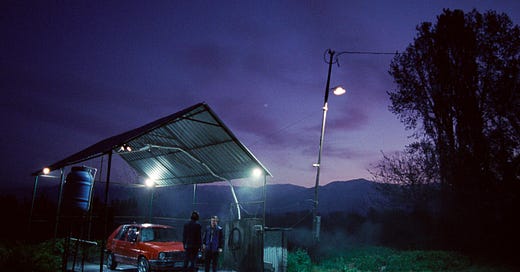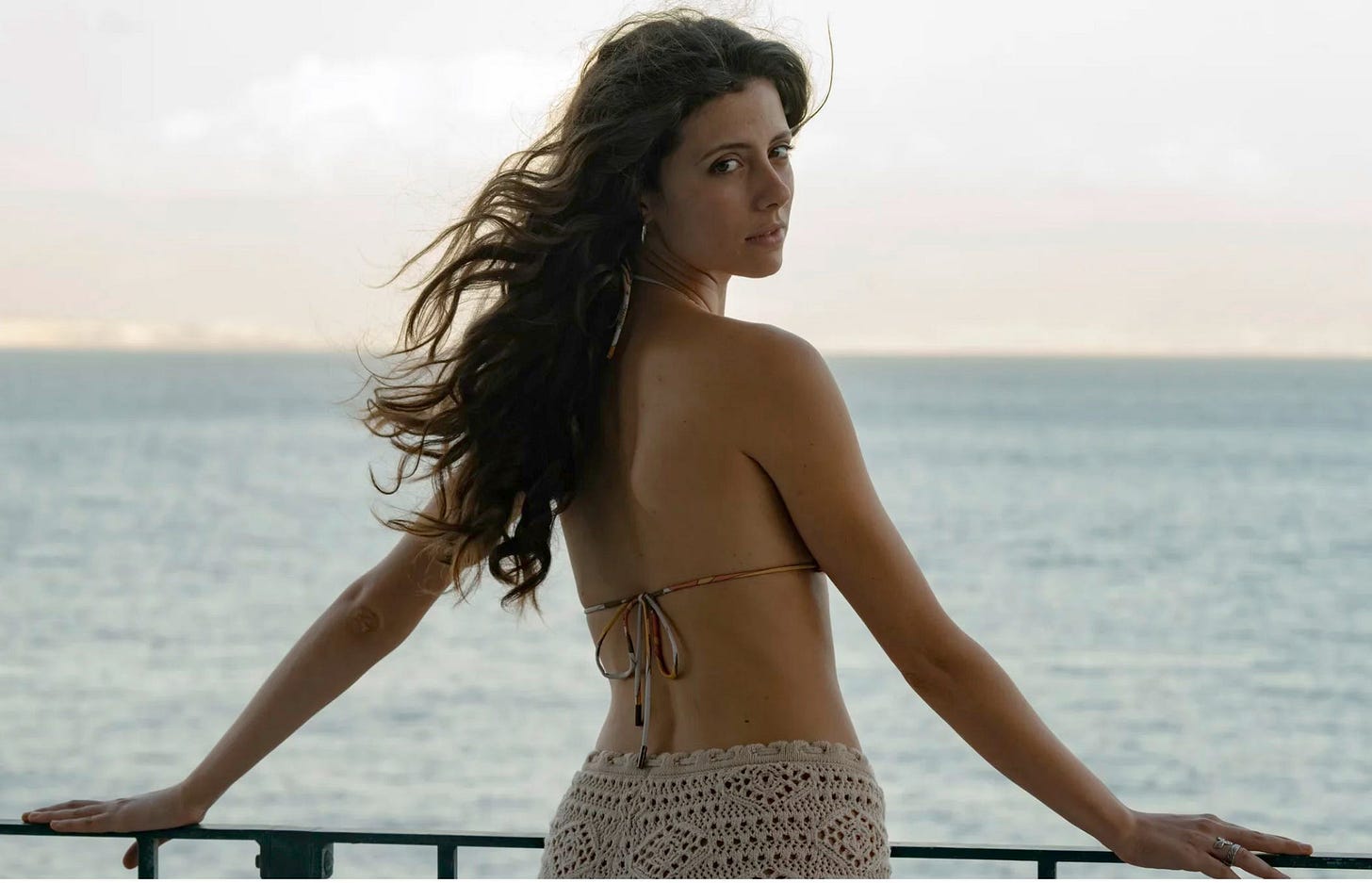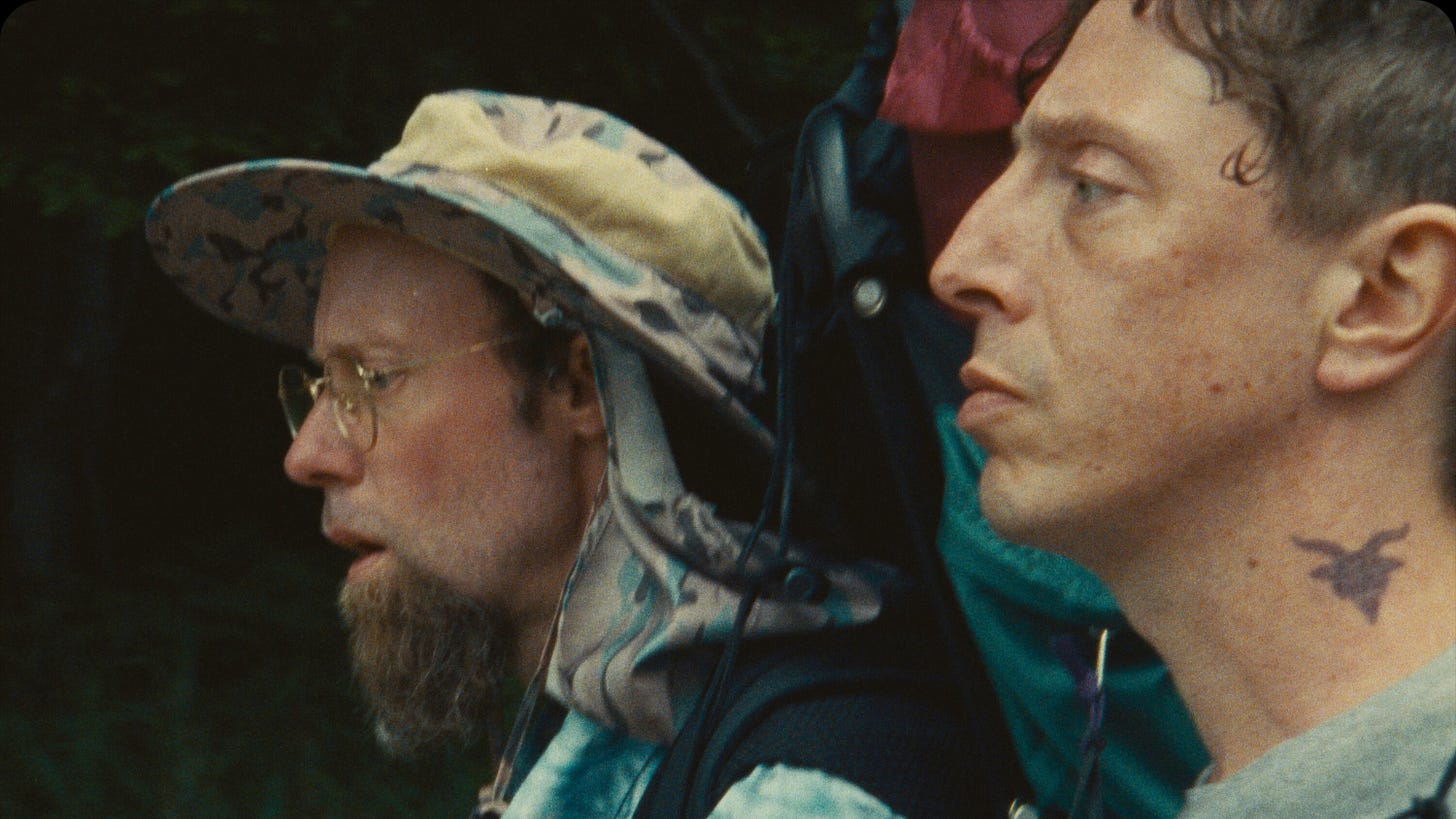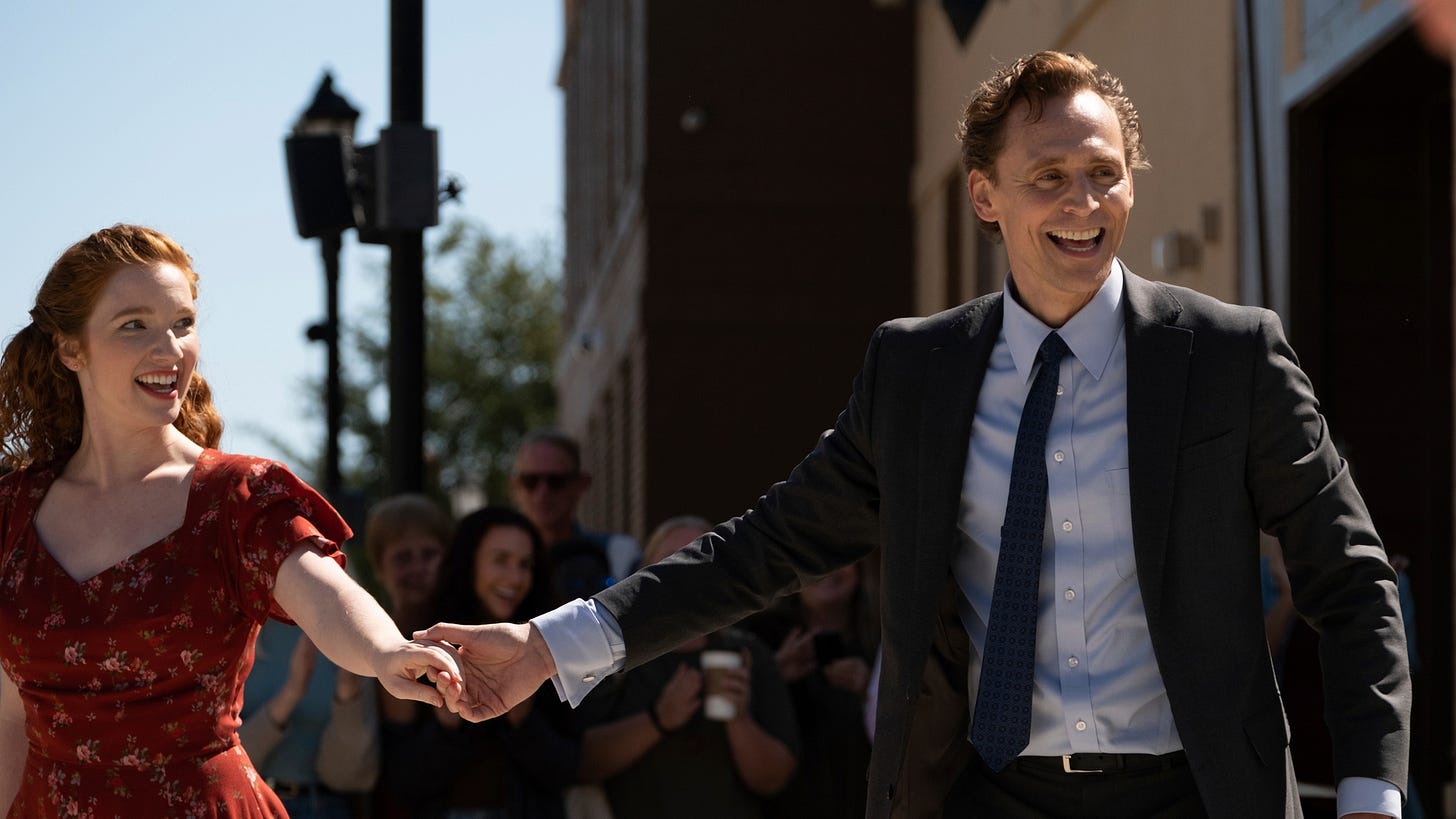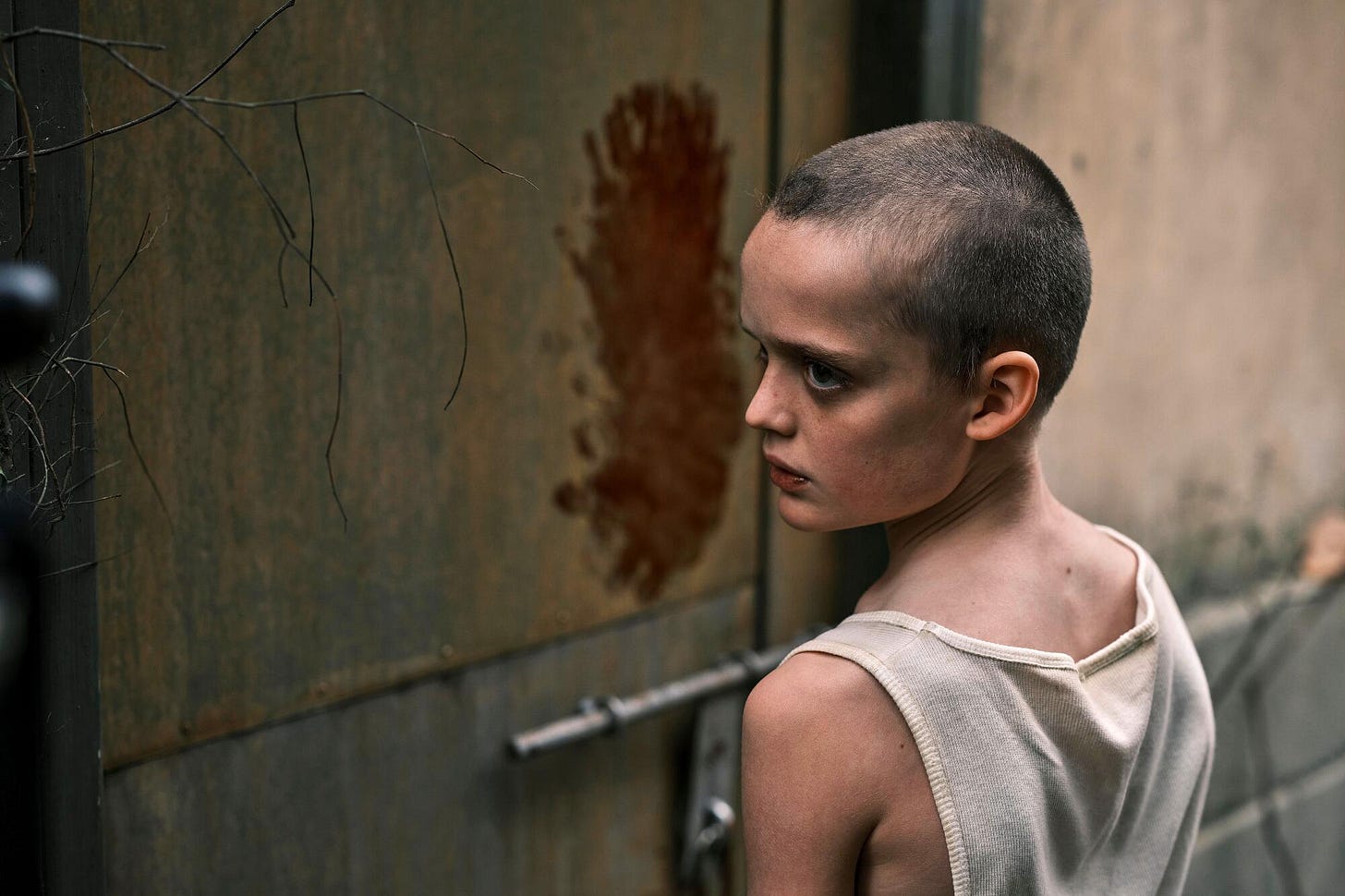It hasn’t been the strongest year so far from what I’ve seen, and frankly having a round up that’s largely critical made me a bit weary about even doing one in the first place. Many of this year’s highlights were from last year’s festival circuit and have finally gotten a general release by their distributors. I’ve also been busy with other things to keep up with new releases or catch up on festival fare as much as I’d like to, but that’s the same story every year.
So here are my thoughts on seven new releases from 2025, along with some brief words and self-promotion on four films I’ve written about elsewhere. Depending on how this goes, I may do a second part where I can share my feelings on titles like Materialists, the new Mission: Impossible entry, Friendship, and (sure, what the hell) the new M3GAN movie among others, if there’s any interest in that (please let me know if you’d be interested in that!).
Read, enjoy, agree, disagree, etc. as you wish.
Presence & Black Bag (dir. Steven Soderbergh)
The Steven Soderbergh/David Koepp double feature of 2025 nobody asked for came and went pretty quickly, and even if not a lot of people cared about either of them the two films got an unexpected reaction out of me. Put together, both could represent a simplified version of the yin and yang that Soderbergh tends to operate in: entertaining Hollywood fare with broad appeal (the Ocean’s trilogy, Magic Mike, Erin Brockovich, Logan Lucky) and exercises where he experiments in different ways (the branching narrative of the Mosaic app, whatever he could come up with each week for The Knick, producing a terrible broadcast of the Academy Awards).
Presence falls in the latter category, with Soderbergh quietly filming the low-budget, single location thriller during the dual WGA/SAG-AFTRA strikes in 2023 with the necessary waivers. The experiment here is to have the camera in Presence be its own character, as it’s the first-person perspective of a ghost haunting a house that a rich, dysfunctional family just moved into. And to ensure that concept meets the expectations of a disembodied voyeur existing outside of time, Soderbergh has the camera floating around from room to room, each scene a single take separated by hard cuts to black.
It has its charms for a little while. At the beginning I got some entertainment out of Soderbergh trying his hand at something resembling Michael Haneke. But there’s a difference between experimentation and fucking around, and Presence soon runs out of steam thanks to Koepp’s boneheaded story (don’t think too much about the involvement of the opioid crisis or its circular plot twist, Koepp clearly didn’t) and Soderbergh’s assumption that his acrobatic operation of his camera rig could prop this thing up for 85 or so minutes. At one point I wondered if he conceived of this whole project as a convoluted way to do more cardio. Signing up for a HIIT class would be a lot cheaper.
To my surprise, the better Soderbergh/Koepp film this year turned out to be the bigger budgeted Hollywood effort Black Bag, a film with over 25x the budget of Presence that can be explained in a fraction of the time it took me to describe that film’s hook. There’s a sexy spy couple, a mole in their agency, suave suspects, and a whole lot of scheming until everyone lays their cards on the table. It’s weirdly traditionalist in the way it treats the unshakeable bond of its monogamous, married hetero protagonists as the kind of glue that can stop a country from triggering World War III (don’t think too much about the film’s superfluous treatment of its politics, Koepp clearly didn’t).
But I don’t mind that since Black Bag proves its point: it sticks to a solid, familiar framework of narrative storytelling and churns out a pleasant bit of light entertainment with a strong, charismatic ensemble. Compared to Presence, Black Bag flows better without carrying around the cumbersome weight of an artistic conceit.
Sinners (dir. Ryan Coogler)
To put it politely: I’m not a fan of Ryan Coogler’s populist style, which crosses the boundary from good old-fashioned, broadly appealing entertainment to banal pandering. I came away from Sinners thinking that Coogler is a truly commercial filmmaker, in that his approach aligns with advertising. He’s here to sell a product, and he does it in such a way that every single person in the room will understand exactly what’s being sold in an entertaining way.
And sure, that sounds like the entire point of big studio fare, but I don’t find Coogler is especially good at it. Is there a reason why every plot element or part that points to its themes have to be bolded, italicized, and underlined every single time? Is there a point to a callback if you immediately cut away to the thing you’re calling back to, in case anyone might have missed it? Coogler directs in signposts, and I found myself bored by it. Take the central sequence where Sammie (Miles Caton) sings a number in Smoke and Stack’s juke joint so good that it transcends time to bring together different music styles and cultures. Coogler films it in a bravura single take, but he repeats the film’s opening narration which flatly states the idea, and then does the most literal interpretation of it: by placing past, present, and future in the same room. It felt more fitting as an ad for Apple or Spotify.
At least everything pre-genre switch is fine, since it gives the ensemble some room to show off. Things go south once the horror elements come in simply because Sinners turns into a bad horror/action film. The direction switches between uninteresting coverage and incomprehensible action sequences (it boggles my mind that, after spending so long in the juke joint, Coogler does so little with that space when we get to the climax). The writing crams too much in and then links it together with flimsy contrivances (shoving a white supremacist massacre after the vampire portion wraps up to give Smoke a hero’s exit is a good example of Coogler’s pandering, as well as his awkward writing by jamming several different endings together). It’s a lot of ineptitude for me that has put me firmly on the opposite side of the more positive responses from audiences and reviewers, so I chalk it up to a difference in preferences.
A moment like the aspect ratio opening up right as the climactic battle kicks off, with the top and bottom bars of the screen moving like curtains opening up for the big show, means Coogler is first and foremost a showman here. And Sinners does function as a platonic ideal of the “one for me” film that some hoped would result from Marvel and other Hollywood studios snatching up Sundance darlings to direct their franchises and tentpoles. I can understand that might have an appeal even though, in Coogler’s case, it’s more of a “three for them, one for me” arrangement. All I saw was a messy film, not in terms of its concepts or ideas that stared at me in the face whenever they came to the forefront, but as an example of bland and bad filmmaking.
Warfare (dirs. Alex Garland & Ray Mendoza)
I used to be a fan of Alex Garland. I thought Sunshine was great, and I even liked Never Let Me Go and Dredd. And while I didn’t care for his directorial debut Ex Machina, I thought Annihilation was a good adaptation of Jeff VanderMeer’s novel because it tried to adapt the source material to a new medium rather than directly translate it. But what his miniseries Devs hinted at and his film Men creeped toward has now been confirmed by 2024’s Civil War and this year’s Warfare: Alex Garland is fucking stupid.
I’m not sure why Garland decided to step his foot into politics, but the smug, self-important tone smeared all over Civil War and Warfare shows he took that step with the confidence of a man who can’t smell the pile of shit he just stomped on. Civil War sees him imagine an America in the near future split into two warring factions from the POV of photojournalists making their way to capture an upcoming battle in the nation’s capital. Aside from showing America in the same light as the war-torn, underprivileged nations whose struggles are often communicated through journalists (you can all but hear Garland whispering “It could happen to you” from behind the camera), Civil War has nothing to say. Garland invents a political conflict and then firmly plants himself at the sidelines of it, acting as impartial observer overlooking his fiction so we can “hmm” and “ahh” over it. All I can see is Garland looking down at us.
Now we get to Warfare, which he co-directed and co-wrote with Iraq war veteran Ray Mendoza. Despite a switch from the fiction of Civil War to a story based on real-life events, from the beginning Garland immediately places himself into a fake “neutral” role. Opening titles explain that Warfare portrays a battle between a platoon of US Navy SEALs and a group of Al-Qaeda fighters in 2006 in Iraq, and the film is taken from the testimonies of the platoon members. This framing means Garland gets to paint himself as the messenger, merely helping bring this one-sided account to cinematic life while basking in the praise of making a gritty, nuts-and-bolts take on the visceral realities of wartime combat. He even went so far as to downplay his role while doing press for Civil War, calling himself a “supporting character” to Mendoza.
What a privileged positon where Garland can sit so pretty. He thinks he can take an issue as recent as the Iraq War, one where the ramifications of that disaster are still reverberating today, and act like he’s researching centuries old history. All of the feigned objectivity around this film is flimsy bullshit. You could take the same approach as Warfare and apply it to the other side of this battle, or any side of any battle. You can point to that as proof of Warfare being apolitical or impartial in its approach, but my point is that this focus takes away from the politics of the choices made within this format: who you portray, who you show, who you privilege over others.
I think of two moments in Warfare that sum up why I find it useless, both of which happen at the end. The first is the final shot before the credits, after the soldiers flee in tanks and the camera lingers on the street’s residents and enemy combatants emerging out of hiding spots before a sudden cut to black. The second happens during the end credits, set to Low’s “Dancing and Blood”, where we get side by side shots of the actors and the real-life counterparts they played. Most of them have blurred faces, including a shot of a blurred family photo of the people whose house was taken over by the platoon and destroyed in the battle. It then cuts directly to a photo of the cast, Mendoza, and other members of his unit all flipping off the camera. Maybe a smarter filmmaker would have put some thought into the choices behind these cuts or the sequencing, or the foolishness of telling a story in tunnel vision with your own method style of burying your head in the sand. Alex Garland is not that filmmaker because Alex Garland is fucking stupid.
Misericordia (dir. Alain Guiraudie)
Alain Guiraudie: one of France’s best directors working today? Probably. Misericordia was my favourite film of 2024, and it received a release earlier this year through Janus/Sideshow in the US and Films We Like in Canada. I first wrote about Misericordia after I watched it at TIFF, then did a blurb for my Top Ten of 2024, and finally interviewed Alain Guiraudie about the film. You can stream Misericordia now on The Criterion Channel and probably buy/rent it on VOD, so if you haven’t watched it yet go and fix that immediately.
Parthenope (dir. Paolo Sorrentino)
I’m not interested in making a case for Parthenope, just as Paolo Sorrentino isn’t interested in making a case for any of what he talks about in his film. Parthenope premiered in competition last year at Cannes and received, at least in some circles, a largely negative reaction. I remember getting the sense of exhaustion from several responses to Parthenope, an undercurrent of “I don’t want to deal with this” when having to muster enough words about a director’s vision you couldn’t give two shits about.
I don’t blame anyone who feels that way about Sorrentino. It didn’t help that Parthenope arrived with descriptions of it being the first film by him with a female protagonist. It’s a fun bit of shade to use the word “first” to imply someone’s dead last, or as a celebration of their first step away from the old way of doing things. It probably made things worse that this first female lead gets saddled with the double duty of representing Sorrentino’s beloved Naples and the concept of beauty itself. Jep Gambardella in The Great Beauty had it easy; if Sorrentino was going to write a woman, he was going to make sure he put her to work.
All of this is to say that I understand why Sorrentino doesn’t work for everyone, and while Parthenope isn’t one of his stronger films I liked it for the most part. I prefer his films when they operate with the right balance of gorgeous and silly (it’s why I consider This Must be the Place to be one of his best films and Youth to be one of his worst). Parthenope shows its title character (again, the embodiment of beauty) going through life from the glory days of growing up isolated to navigating a world unable to understand or appreciate her, save for one mean anthropology professor (a bit of a shame that Silvio Orlando’s performance will likely get forgotten alongside the film). A scene in the first act between Parthenope and a rich man clamouring for her sets up the dynamic she’ll face throughout her adult life: he sees her as a trophy to win, she asserts herself as a full-fledged individual, and he responds by ruthlessly attacking her to try and dim the things that drew him to her in the first place.
Parthenope hops from one experience or fling to another across decades, and Sorrentino does his usual schtick of beautiful looking sequences designed to embody his maximalist appreciation for all life and humanity has to offer, both good and bad. I’m perfectly fine with this for purely subjective reasons. Sorrentino is unabashedly indulgent as always, and here I’m happy to take in most of it. There’s something enjoyable about watching an entirely different perspective than mine, especially when that person has a good sense of style and an episodic structure to make it go down easier.
Vulcanizadora (dir. Joel Potrykus)
Another one of my favourites from last year that’s finally out now thanks to Oscilloscope Laboratories, I wrote about Vulcanizadora over at The Film Stage when I interviewed Potrykus at the Fantasia Film Festival. If you’re in the US, you can watch it on VOD.
The Life of Chuck (dir. Mike Flanagan)
I reviewed The Life of Chuck after it premiered at the Toronto International Film Festival in September 2024, where it ended up winning the People’s Choice Award. You can read my review above for why I found myself so disappointed by Mike Flanagan’s latest Stephen King adaptation, which I would describe as feeling like someone sitting down to tell your adult self that your pet isn’t around anymore because it moved to a farm upstate.
I’ve been a fan of Mike Flanagan’s ever since I saw his feature debut Absentia and was blown away by Oculus, which is one of the best horror films to come out of the 2010s. His earlier films had a mean streak to them, with broken characters representing anxieties around death, loss, grief, and addiction that would wind up with fates that realized those anxieties in disturbing ways. I like to think of Flanagan’s adaptation of The Haunting of Hill House as the final chapter in that part of his career, where he addresses the same ideas but ends at a place of closure and hope for the future.
With that change in outlook comes a lot of sentimentality and self-importance, exemplified by his reliance on lengthy monologues he likes to give his characters. Flanagan, his wife and collaborator Kate Siegel, and the troupe of performers they’ve built over the years even have a term for it called “Flanalogues,” and I leave it to you to decide if the term should be seen as affectionate or annoying. Between The Life of Chuck, Midnight Mass, and what I saw from The Fall of the House of Usher, my interests and Flanagan’s have diverged quite a bit over the past decade. I could call it bittersweet but I don’t think it’s that serious. It’s a slight bummer to lose interest in a filmmaker whose career I followed closely and championed from the beginning, especially when they actually get the success they deserve. I approach his work with a bit more caution going forward, and Flanagan gets a first look TV deal with Amazon. We’ll all be fine.
April (dir. Dea Kulumbegashvili)
I wasn’t a fan of Beginning, Dea Kulumbegashvili’s feature debut from 2020 that looked gorgeous but indulged in a forbidding style of festival friendly fare that fizzled out in the mid-2010s. April sees Kulumbegashvili double down on that style, and had me thinking back to films like 4 Months 3 Weeks 2 Days, The Tribe, Godless, and more Eastern European miserabilist fare from years ago. Does April signify a revival of this particular kind of filmmaking? Are we all ready to sit down and take in ultra-precise compositions, characters put through hell and back, swift and horrific violence, and long takes sure to be timed and mentioned in reviews by the trades?
I thought we moved on from this, but the high praise out of Venice (where it won a Special Jury Prize), Toronto, and New York shows there’s still a pulse. I grew tired of the kind of filmmaking Kulumbegashvili specializes in because, at a certain point, it looked like posturing instead of anything meaningful, just intent for the sake of intent dressed up in a style that demands respect. Lead character Nina, an OB-GYN who performs illegal abortions on the side in her traditionalist and patriarchal village, is isolated and miserable, and her feelings take shape as some sort of monstrous creature covered in sagging skin that pops in and out of the film. And in case you don’t get the meaning of this surreal image, Kulumbegashvili makes sure you will.
It’s all impressive in terms of craft, from Arseni Khachaturan’s cinematography to Matthew Herbert’s score, but the only takeaway I had from April was how nice it looked. There’s a sequence early on where Nina drives around town at sundown, looking to pick up a man she can have sex with. It’s a gorgeous sequence, with the camera panning around from inside her car to show off the striking visuals of nighttime creeping in. Then, after Nina picks someone up, we see him switch between groping her and talking to her in a long take from the passenger side of the car (we only see the man’s hands and hear his voice). A few seconds into the shot, I guessed that he was going to assault Nina at some point. About a minute later he slams her head into the steering wheel, in a sudden burst of violence reminiscent of films by Michael Haneke or Yorgos Lanthimos. I don’t care to watch a film that puts me into this mindset, no matter how good it looks in low light.
Bring Her Back (dirs. Danny & Michael Philippou)
After being pleasantly surprised by Talk to Me, Bring Her Back shows Danny and Michael Philippou as one trick ponies. There’s very little to take from this pastiche of A24’s horror catalogue beyond the message that losing a loved one sucks, a universal truth rendered into something facile by elevating the Philippou’s juvenile instincts they try to disguise by cloaking it with the grave topics of grief and trauma.
Talk to Me also dealt with the same ideas, but it was attached to the classic horror story of facing consequences via a game involving a plaster arm that could communicate with the dead. The film sets up a system with more than one failsafe and an explicit rule to follow, then has its fun doling out the aftermath once someone does everything they aren’t supposed to. Bring Her Back opts to keep its secrets from the start, when siblings Andy (Billy Piper) and his blind half-sister Piper (Sora Wong) wind up at the home of foster mom Laura (Sally Hawkins), who’s still grieving the loss of her daughter who was also blind. Slow, brooding zoom-ins on ritualistic objects around Laura’s home tip us off that something is wrong, although the shoddy pacing, tone, and structure did a fine enough job at that anyway. Every moment hinting at whatever dark reveals are about to come have all the grace of someone repeatedly saying “I know something you don’t know.”
There isn’t much else to say plot wise. Laura got a hold of some forbidden how-to videos and plans to use them to resurrect her daughter through Piper. Meanwhile, the Philippous use their tried and true shorthand of fucking children up to make their horror “gnarly” and “brutal” (when in doubt, feed a child a knife I guess). I kept thinking back to the New French Extremity of the 2000s, that little movement of ultraviolent horror films out of France like High Tension and Inside. Those films had more to admire because they didn’t try to act like they were better than what they really were. With Bring Her Back, I have to see the Philippous acting like they’re doing something meaningful here, as evidenced by their laughable sympathy edit of Laura in the film’s closing minutes. This is the same film that introduces a blind character only to have her Mr. Magoo her way through the final act to try and add tension. Grow up.
The Accident (dir. Giuseppe Garau)
After reviewing The Accident and interviewing director Giuseppe Garau at Slamdance in 2024 (where it won the Grand Jury Prize), I’m happy that the film found a home via Fandor where it’s currently streaming. It’s a solid black comedy about a woman trying to claw her way back to stability through a cruel, ruthless environment, which Garau films entirely from the car’s passenger seat. If you’re looking for one of the “hidden gems” of the year, a film that tends to fly under everyone else’ radar, this is the one you should watch.
